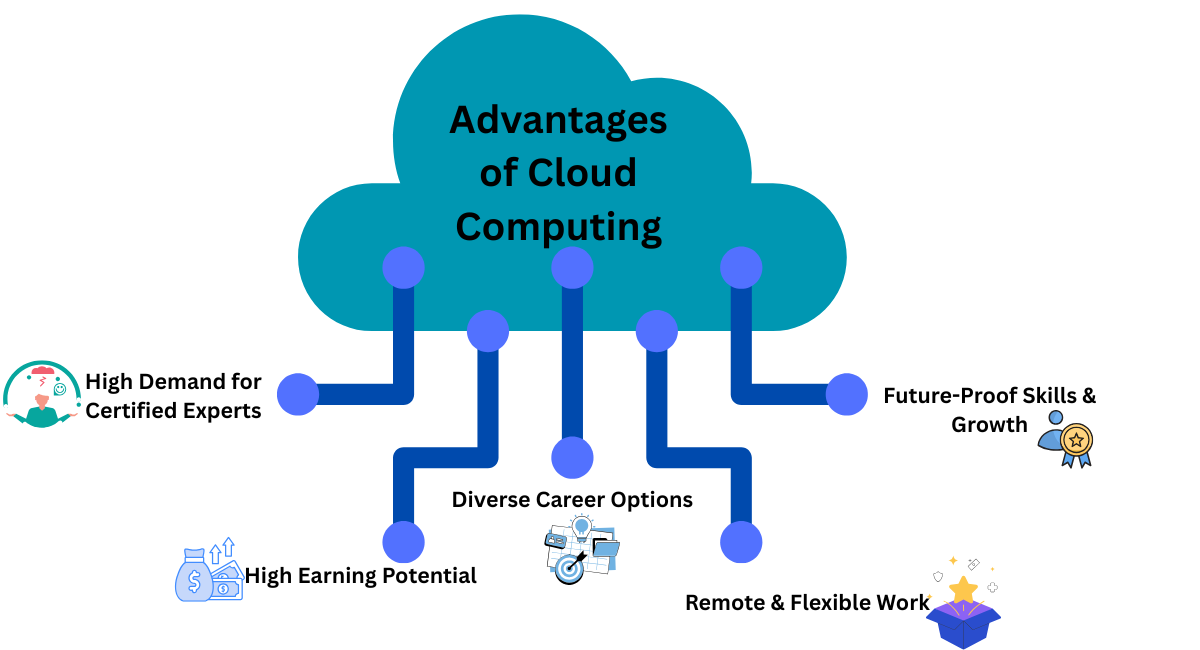The Top 5 Advantages of Cloud Computing: Career Development, Salary Perspectives, and Certification

Cloud computing has transformed how businesses operate, offering agility, scalability, and innovation at an unprecedented pace. As organizations rapidly migrate their infrastructure to the cloud, the demand for cloud professionals continues to rise. Whether you're an aspiring IT professional or looking to upskill, cloud computing opens the door to exciting career opportunities. Here are the top five benefits of cloud computing, with a focus on certifications, salary trends, and long-term career growth.
1. High Demand for Certified Experts
The adoption of cloud services by businesses of all sizes has created a massive demand for skilled professionals. Certifications validate your knowledge and signal to employers that you're ready to take on cloud responsibilities. Top cloud certifications include:
-
AWS Certified Solutions Architect – Associate
-
Microsoft Certified: Azure Administrator Associate
-
Google Professional Cloud Architect
-
Certified Kubernetes Administrator (CKA)
These certifications are often prerequisites for cloud roles and help candidates stand out in a crowded job market. Certification paths also provide structured learning, making it easier for professionals to build expertise.
2. High Earning Potential
Cloud computing is among the highest-paying domains in the IT industry. According to industry surveys and salary reports:
-
An AWS Certified Solutions Architect can earn an average salary of $120,000 to $160,000 in the United States.
-
A Google Cloud-certified professional earns around $140,000 annually.
-
In India, certified professionals typically earn between ₹12 to ₹25 lakhs per annum, depending on experience and expertise.
As companies invest more in cloud infrastructure, they’re willing to pay top dollar for experts who can manage, secure, and optimize cloud environments.
3. Diverse Career Options
Cloud computing offers diverse career options across various industries. With the right skills and certifications, professionals can explore roles such as:
-
Cloud Solutions Architect
-
DevOps Engineer
-
Cloud Security Specialist
-
Site Reliability Engineer
-
Cloud Consultant
These roles allow professionals to work on cutting-edge technologies like artificial intelligence, machine learning, IoT, and big data—all of which are powered by cloud platforms.
4. Remote & Flexible Work
The cloud’s virtual nature makes it easier to work from anywhere. Many companies offer remote cloud roles, giving professionals flexibility and a better work-life balance. Cloud engineers, consultants, and architects can monitor, deploy, and troubleshoot infrastructure using cloud dashboards and tools remotely. This flexibility also opens up global freelancing and consulting opportunities.
5. Future-Proof Skills & Growth
Cloud computing is not a passing trend—it’s the foundation of digital transformation. Businesses across all sectors are adopting cloud-first strategies. By building cloud expertise now, you prepare yourself for long-term success. Cloud skills are also transferable across platforms, allowing professionals to pivot between AWS, Azure, and Google Cloud as needed.
Learn more: Cloud computing benefits
- Art
- Causes
- Crafts
- Dance
- Drinks
- Film
- Fitness
- Food
- Oyunlar
- Gardening
- Health
- Home
- Literature
- Music
- Networking
- Other
- Party
- Religion
- Shopping
- Sports
- Theater
- Wellness
- IT, Cloud, Software and Technology


